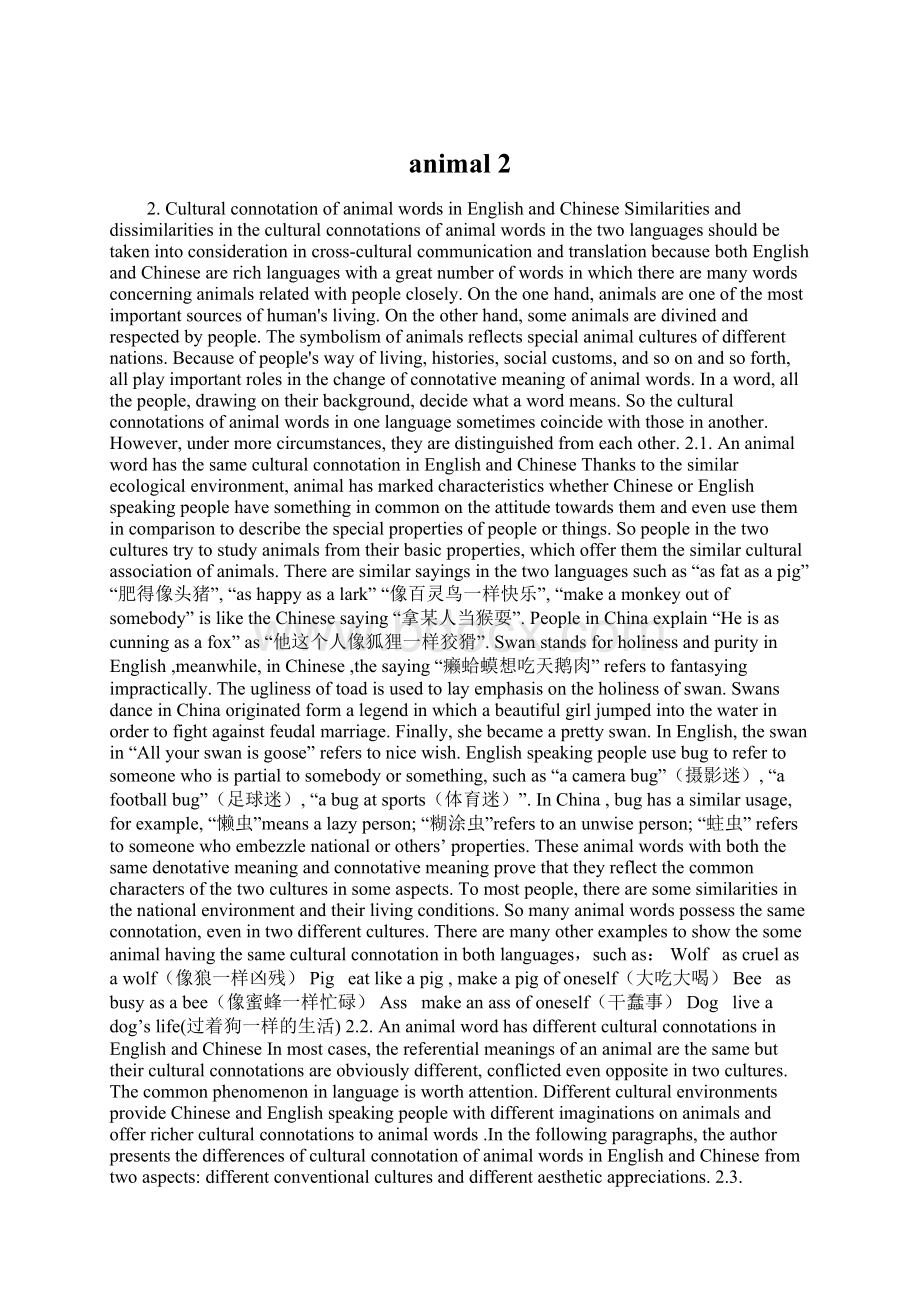animal 2.docx
《animal 2.docx》由会员分享,可在线阅读,更多相关《animal 2.docx(11页珍藏版)》请在冰豆网上搜索。

animal2
2.CulturalconnotationofanimalwordsinEnglishandChineseSimilaritiesanddissimilaritiesintheculturalconnotationsofanimalwordsinthetwolanguagesshouldbetakenintoconsiderationincross-culturalcommunicationandtranslationbecausebothEnglishandChinesearerichlanguageswithagreatnumberofwordsinwhichtherearemanywordsconcerninganimalsrelatedwithpeopleclosely.Ontheonehand,animalsareoneofthemostimportantsourcesofhuman'sliving.Ontheotherhand,someanimalsaredivinedandrespectedbypeople.Thesymbolismofanimalsreflectsspecialanimalculturesofdifferentnations.Becauseofpeople'swayofliving,histories,socialcustoms,andsoonandsoforth,allplayimportantrolesinthechangeofconnotativemeaningofanimalwords.Inaword,allthepeople,drawingontheirbackground,decidewhatawordmeans.Sotheculturalconnotationsofanimalwordsinonelanguagesometimescoincidewiththoseinanother.However,undermorecircumstances,theyaredistinguishedfromeachother.2.1.AnanimalwordhasthesameculturalconnotationinEnglishandChineseThankstothesimilarecologicalenvironment,animalhasmarkedcharacteristicswhetherChineseorEnglishspeakingpeoplehavesomethingincommonontheattitudetowardsthemandevenusethemincomparisontodescribethespecialpropertiesofpeopleorthings.Sopeopleinthetwoculturestrytostudyanimalsfromtheirbasicproperties,whichofferthemthesimilarculturalassociationofanimals.Therearesimilarsayingsinthetwolanguagessuchas“asfatasapig”“肥得像头猪”,“ashappyasalark”“像百灵鸟一样快乐”,“makeamonkeyoutofsomebody”isliketheChinesesaying“拿某人当猴耍”.PeopleinChinaexplain“Heisascunningasafox”as“他这个人像狐狸一样狡猾”.SwanstandsforholinessandpurityinEnglish,meanwhile,inChinese,thesaying“癞蛤蟆想吃天鹅肉”referstofantasyingimpractically.Theuglinessoftoadisusedtolayemphasisontheholinessofswan.SwansdanceinChinaoriginatedformalegendinwhichabeautifulgirljumpedintothewaterinordertofightagainstfeudalmarriage.Finally,shebecameaprettyswan.InEnglish,theswanin“Allyourswanisgoose”referstonicewish.Englishspeakingpeopleusebugtorefertosomeonewhoispartialtosomebodyorsomething,suchas“acamerabug”(摄影迷),“afootballbug”(足球迷),“abugatsports(体育迷)”.InChina,bughasasimilarusage,forexample,“懒虫”meansalazyperson;“糊涂虫”referstoanunwiseperson;“蛀虫”referstosomeonewhoembezzlenationalorothers’properties.Theseanimalwordswithboththesamedenotativemeaningandconnotativemeaningprovethattheyreflectthecommoncharactersofthetwoculturesinsomeaspects.Tomostpeople,therearesomesimilaritiesinthenationalenvironmentandtheirlivingconditions.Somanyanimalwordspossessthesameconnotation,evenintwodifferentcultures.Therearemanyotherexamplestoshowthesomeanimalhavingthesameculturalconnotationinbothlanguages,suchas:
Wolf ascruelasawolf(像狼一样凶残)Pig eatlikeapig,makeapigofoneself(大吃大喝)Bee asbusyasabee(像蜜蜂一样忙碌)Ass makeanassofoneself(干蠢事)Dog liveadog’slife(过着狗一样的生活)2.2.AnanimalwordhasdifferentculturalconnotationsinEnglishandChineseInmostcases,thereferentialmeaningsofananimalarethesamebuttheirculturalconnotationsareobviouslydifferent,conflictedevenoppositeintwocultures.Thecommonphenomenoninlanguageisworthattention.DifferentculturalenvironmentsprovideChineseandEnglishspeakingpeoplewithdifferentimaginationsonanimalsandofferricherculturalconnotationstoanimalwords.Inthefollowingparagraphs,theauthorpresentsthedifferencesofculturalconnotationofanimalwordsinEnglishandChinesefromtwoaspects:
differentconventionalculturesanddifferentaestheticappreciations.2.3.DifferentconventionalculturesThedragoninEnglishand“龙”inChinesearebothimaginaryanimalsbuthaveverydifferentconnotations.ToChinese“龙”issomethingsacredandhasbeenreferredtoastheancestoroftheChinesenation.ThatiswhytheChinesecallthemselves“龙的传人”(descendantsofthedragon)andChinesefeudalemperorswereoftenreferredtoas“真龙天子”,wearing“龙袍”,livinginpalacesdecoratedwiththedragon.“龙王”(thedragonking)isapowerfulgodinChineselegendarywhichrulestheseasandotherwaterbodiesandisinchargeofraining.ManyChinesewould“望子成龙”,butitsliteraltranslation“toexpectone’ssontobecomeadragon”wouldsoundridiculoustotheEnglishspeakingpeople,becauseintheirmindthedragonissomeevilmonsterwhichcanspitfireandpossessesthreetonineheads.ThereareveryfewEnglishidiomswiththeword“dragon”except“blinddragon”and“fightlikeadragon”.Outofsuchconsideration,“亚洲四小龙”isproperlyturnedinto“thefourtigersofAsia”.Phoenixisanunusualkindofanimal,whichisthekingofallthebirdsinChineselegendary.Itisbelievedthatphoenixisthesymbolofpeacefulnessanditbringspeoplegoodluck.Inancienttimes,itwasusedtocomparetoapersonwithvirtue.“凤毛麟角”referstorare,preciouspersonsorthings.“山窝里飞出了个金凤凰”meansthatapersonwithspecialabilitycomesfromaremotevillage.However,InEnglish,itissaidthatphoenixlivedinSaharaforabout500years.Itwouldbuildanestcoveredwithspicebeforeburningitselfintoashesfromwhichanewphoenixwasborn.Therefore,phoenix,inEnglish,standsforregeneration.Forexample,Religion,likeaphoenix,hasbeenresurrectedformtheashesofthewar.2.4.DifferentaestheticappreciationsAestheticappreciationisrelatedwithpeople’spreferenceordetestationtowardsanimals.Thecorrespondinganimalwordwillhavefavorablemeaningiftheanimalisappreciated,onthecontrary,itwillhavenegativemeaningiftheanimalisdisgusted.2.4.1.ThesameanimalwordbearsfavorablemeaningsinEnglishbutderogatorymeaningsinChineseTakedogforexample,inmostcases,theword“dog”isfavorableinitsconnotationintheEnglishlanguage.Thisisreflectedinsayingslike“Loveme,lovemydog”;“aluckydog”.“Tohelpalamedogoverthestile”meanstohelpsomeoneindifficulty.“Everydoghasitsday”meanseverypersonwillsomedaysucceedorbecomefortunate.ButfiguresofspeechlikethesearenotproperinChineseastheword狗inmostChinesephrasesareassociatedwithsomederogatoryconnotation,asisreflectedinsayingslike“狗急跳墙,狗头军师,狗仗人势,狐朋狗友,狗心狼肺,狗眼看人低,狗嘴里吐不出象牙,丧家之犬”,etc.InGreekandRomanmythology,owlalwaysstaysbythegoddessofwitness.Itisinvitedtomakeaverdictonargumentsbetweenanimals,especiallyonemergentoccasions.Therefore,inEnglish,owlisabirdstandingforwitness.Suchas“aswiseasanowl”Owlishreferstoclever,shrewd.Forexample,Patrickpeeredowlishlyatusthroughhisglasses.However,inChinese,owlisthoughtasasymbolofomenbecauseitalwaysfliesaroundgraveyardatnight,sendingoutsadvoice.Intheoldlegend,itissaidthatsomeonewoulddieiftheowlrestonhishouse.Owlisrelatedtobadluck,death.Therearemanyexpressionsshowingpeople’sviewtowardsowl,suchas“夜猫子进宅,无事不来”,“夜猫子抖翅,大小有点事”,“夜猫子进屋,全家都哭”,etc.Whaleisahugeanimal,soinEnglishitisasymbolofvaluablethings.Thefollowingexamplesprovesit----awhaleofachance(一个极好的机会),whaleonskating(滑冰高手),awhaleattennis(善打网球的人).However,inchina,peoplepaylittleattentiontoitsvaluebuttoitshugeappetite.“蚕食鲸吞”meansthatasmallcountryisembezzledlikeasilkwormeatinglittlebylittleorlikeawhaleswallowing.2.4.2.ThesameanimalwordbearsderogatorymeaningsinEnglishbutfavorablemeaningsinChineseInChinese,“猫”isasymbolofloveliness,shrewdness.Chinesepeoplelovecatbecauseitisalovelycompanionanditisamasterincatchingmice.Someancientpoetswrotepoemstoprizecats.ButinEnglish,catisembodimentofdevil.Peopledetestcat,especiallytheblackcat.InChinese,“喜鹊”isanauspiciousbird.itissaidthatitsvoicebringsgoodnewsasthefollowingsayingshows:
今朝闻鹊喜,家信必有归;破颜看鹊喜,拭泪听猿啼;鹊声喳喳宁有知,家人听鹊占归期.What’smore,itsvoiceistheforestoffineweather,suchas鹊声宣日出晴色喧从喜鹊知Itisprovedthatmagpiecanbringusgoodluck,whereasinEnglish,itreferstowordy,garrulouspeople.forexample:
Sheisamagpieofawoman.Shekeptmutteringlikeamagpie.ItissuggestedthatpeopleinEnglishspeakingcountiesfeeldisgustedtowardsitsvoice.Besides,itstandsforchaos,disorder.Forexample,“amagpiecollection”,“tomagpietogether”.Apartfromtheaboveexamples,therearemanyotheranimals,suchascricket,cuckoo,bat,petrel,andmouse,havingfavorablemeaningsinEnglishbuthavingderogatorymeaningsinChinese.3.AnanimalwordhasboththesameanddifferentculturalconnotationsinEnglishandChineseLanguage,thereflectionofespeciallysocialculture,istheresultofsocialdevelopmentandeffectspeople'sideas,thoughtandimagination.Differentnationshavedifferentimaginationsaboutanimalsaccordingtotheirownthinkingrules,knowledgescales,livingcustomsandmoralstandardsandthepeopleendowthemdifferentculturalfunctions.Meanwhile,becauseofthesimilarityoftheobjectlivingcircumstances,itisunavoidablethatsomeanimalwords,ontheotherhand,havethesameculturalconnotation.Fox,inbothEnglishandChinese,referstoacommonwildanimalwithacunningnature.Whenusedincomparison,itisasynonymof“slyness,trickiness,anddeceitfulness”.Onthispoint,thesimilarityofculturalconnotationoftheanimalwordisbeyondourmind.PeopleareveryfamiliarwithaseriesofEnglishandChineseidiomsorsayings.Forexample,ascunningasafox(狡猾得像个狐狸),asslyasafox(像狐狸一样狡猾),aslyoldfox(一只狡猾的老狐狸);“露出了狐狸尾巴”,“狐狸再狡猾也逃不过猎人的眼睛